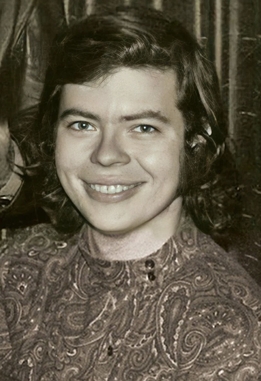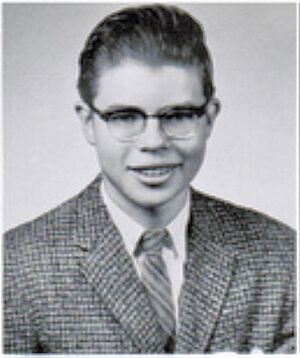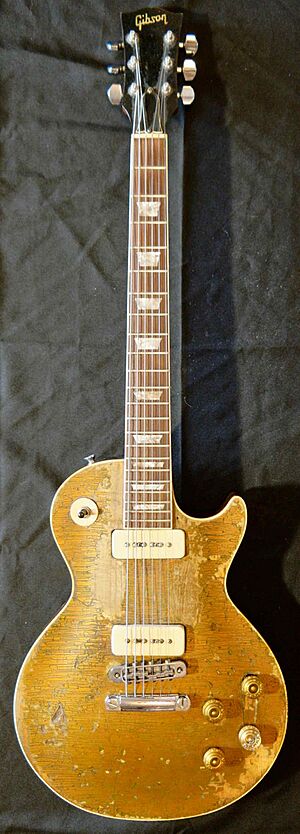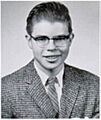Alan Wilson (musician) facts for kids
Quick facts for kids
Alan Wilson
|
|
|---|---|

Wilson in 1968
|
|
| Born | July 4, 1943 Arlington, Massachusetts, U.S.
|
| Died | September 3, 1970 (aged 27) Topanga, California, U.S.
|
| Resting place | Cremated; ashes scattered in Sequoia National Park |
| Other names | Blind Owl, Charles Holloway, Esq |
| Education | Boston University |
| Occupation |
|
| Awards |
|
| Musical career | |
| Genres |
|
| Instruments |
|
| Years active | 1960–1970 |
| Labels | Liberty Records |
| Associated acts |
|
| Signature | |
Alan Christie Wilson (July 4, 1943 – September 3, 1970), known as "Blind Owl", was an American musician. He helped start the blues band Canned Heat. Alan was a co-lead singer and wrote many of their songs. He played harmonica and guitar for the band. He sang lead on their two biggest hit songs: "On the Road Again" and "Going Up the Country".
Contents
Alan Wilson's Early Life and Music Journey
Alan Christie Wilson was born on July 4, 1943, in Arlington, Massachusetts. His father, John, was a bricklayer, and his mother, Shirley, was an artist. Alan was very smart, which sometimes made him a target for bullies at school.
His father enjoyed ham radio, and Alan joined in as a child. But his interest soon turned to music. His stepmother bought him a jazz record, and he taught himself to play the trombone. He even formed a jazz band called Crescent City Hot Five with friends.
How Alan Discovered the Blues
Alan loved traditional New Orleans music. Later, he became fascinated with blues music. A friend played a Muddy Waters record for him, and Alan was hooked. He learned to play the harmonica, inspired by Little Walter. Soon after, he picked up the acoustic guitar after hearing a John Lee Hooker record. Other blues artists like Skip James and Son House greatly influenced him.
After high school, Alan studied music at Boston University. He was a dedicated student of early blues music. He wrote articles for music magazines. However, he wanted to play music more than study it. So, he left college after a year and a half. He worked with his father as a bricklayer and gave music lessons.
Alan Wilson's Music Career
In 1962, Alan met David Evans, another blues fan. They started playing together in coffeehouses in Cambridge, Massachusetts. Alan played harmonica and guitar, and sometimes sang. He became known for his high-pitched singing, similar to blues legend Skip James.
Helping Old Blues Artists
The early 1960s saw many young musicians rediscovering older blues artists. In 1964, Alan helped find John Hurt, who was working on a farm. Alan was invited to play harmonica with Hurt at a show. People said he was "brilliant."
Alan also helped Son House, a blues singer he admired. Son House had forgotten his songs after being away from music for a long time. Alan played House's old recordings for him. He even showed him how to play them on guitar to help him remember. Thanks to Alan, Son House recorded a new album in 1965. Alan played harmonica and guitar on two songs. Son House's manager said that without Alan, Son House's music would not have been rediscovered.
Joining Canned Heat
In 1965, Alan moved to Los Angeles with guitarist John Fahey. Fahey gave Alan the nickname "Blind Owl." This was because Alan was very nearsighted and often forgot his glasses. He once even put his guitar on a wedding cake because he didn't see it!
In Los Angeles, Alan met Bob "The Bear" Hite, another blues fan. Together, they started the band Canned Heat in 1965. The band's name came from an old blues song. Canned Heat started as a jug band. Later, they added Henry "The Sunflower" Vestine on guitar and Frank Cook on drums.
Canned Heat's Rise to Fame
Canned Heat's first big show was at the Monterey Pop Festival in June 1967. They played their versions of old blues songs. Critics praised Alan and Henry Vestine as "the best two-guitar team in the world." They also called Alan "our finest white blues harmonica man."
Alan wrote and sang the band's first big hit, "On the Road Again." This song was a new version of an older blues tune. It became very popular in the U.S. and Europe. Alan played six different parts on the song, including guitar, harmonica, and vocals.
Their third album featured another famous song sung by Alan, "Going Up the Country." This song captured the "back to nature" feeling of the late 1960s. It became a hit worldwide and was the unofficial theme song for the Woodstock Festival in 1969. Canned Heat performed at Woodstock, and "Going Up the Country" was featured in the Woodstock film.
Working with John Lee Hooker
In May 1970, Canned Heat recorded with John Lee Hooker. This was a dream come true for Alan. The album, Hooker 'N' Heat, was the first of Hooker's albums to make the music charts. John Lee Hooker was amazed at how well Alan could follow his guitar playing. He even said Alan was the "greatest harmonica player ever." This was Alan's last recording.
Alan Wilson's Personal Life
Alan was a very sensitive and quiet person. He sometimes found social situations difficult. Some people who knew him thought he might have been on the autism spectrum, but he was never officially diagnosed. Others believed he was just very thoughtful and deep.
Because of his poor eyesight, Alan didn't learn to drive until 1969. He loved nature and often slept outdoors. He had no interest in buying a house. When Canned Heat wasn't touring, Alan would go camping in his van at Yosemite or Sequoia National Park.
Alan Wilson's Dedication to Nature
Alan was a passionate conservationist. He loved reading books about plants and nature. He believed that trees could feel pain. In 1969, he wrote a song called "Poor Moon." It expressed his worry about pollution on the Moon. His clothes were often dirty from collecting leaves and soil samples outdoors.
In 1970, Alan started the Music Mountain Foundation. Its goal was to buy land to add to Redwood National Park. He wanted to protect the coastal redwood trees, which he saw as endangered by pollution. He wrote an essay called 'Grim Harvest' about logging redwoods. It was printed in Canned Heat's album Future Blues. He asked people to donate to his organization to "prevent Future Blues."
Alan even worked briefly for the United States Forest Service in 1969. He studied how pollution affected plants. He was even credited with discovering two new tree species in the Pacific Northwest.
Alan Wilson's Legacy
Alan Wilson is remembered as a pioneer of blues-rock music in the 1960s. He also helped bring back interest in early Delta Blues. Many musicians saw him as an expert on blues history. He was a talented slide guitarist, harmonica player, songwriter, and singer.
Even though his recording career lasted only three years, he left a lasting impact. Mike Bloomfield called him "the best [...] harp player there is." His friend John Fahey said Alan was "among the most significant influences on my musicianship." Alan Wilson was also one of the first environmentalists in the 1960s. He was deeply dedicated to protecting the California redwoods.
Stephen Stills' song "Blues Man" is dedicated to Alan Wilson, along with Jimi Hendrix and Duane Allman.
Alan Wilson's Musical Gear
Alan Wilson used several guitars, but his main one was a 1954 Gibson Les Paul Goldtop. He also used a white Fender Mustang at the 1967 Monterey Pop Festival. For TV shows, he often used a blond Fender Telecaster.
His Les Paul Goldtop was special. It had updated tuners to keep it in tune better. The pickguard was removed to make it easier for his finger-picking style. It also had special pickups that helped create his unique sound.
Awards and Recognition
- Blues Hall of Fame: Legendary Blues Artist Inductee, July 19, 2013
- The Music Museum of New England Inductee
Discography
- Father of the Delta Blues: The Complete 1965 Sessions, with Son House 1965
- The Great San Bernardino Birthday Party & Other Excursions, with John Fahey 1966
- Fred Neil with Fred Neil 1967, Capitol Records
- Slim's Got His Thing Going On with Sunnyland Slim, 1969 World Pacific Records
- John The Revelator: The 1970 London Sessions with Son House, 1970, Vequel Records (re-released in 1995 on Capitol Records as Delta Blues and Spirituals)
- Alan Wilson: The Blind Owl, 2013 (2 CD Severn Records)
Images for kids
See also
 In Spanish: Alan Wilson (músico) para niños
In Spanish: Alan Wilson (músico) para niños





